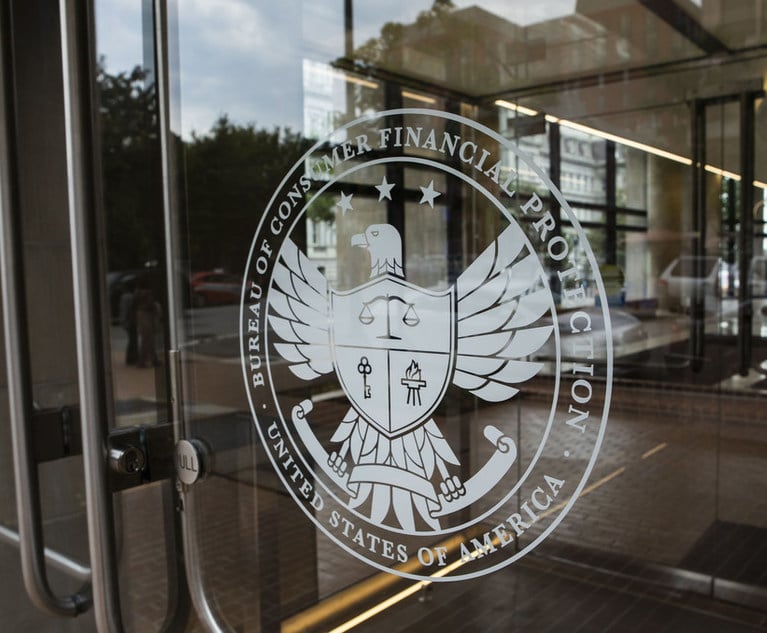Need Help Fighting the CFPB? One Company Turns to Trump's Justice Department
Ocwen Financial Corp., the mortgage loan servicer fighting a new Consumer Financial Protection Bureau lawsuit, has turned to an unlikely source for help: the U.S. Justice Department. In a federal court filing styled as a motion "to invite the views of the attorney general of the United States," the company on Wednesday took the remarkable step of asking the Justice Department to weigh in on the side of a corporation fighting another federal agency.
April 27, 2017 at 11:27 AM
4 minute read
Ocwen Financial Corp., the mortgage loan servicer fighting a new Consumer Financial Protection Bureau lawsuit, has turned to an unlikely source for help: the U.S. Justice Department.
In a federal court filing styled as a motion “to invite the views of the attorney general of the United States,” the company on Wednesday took the remarkable step of asking the Justice Department to weigh in on the side of a corporation fighting another federal agency.
At the heart of Ocwen's request is the fact the Justice Department under U.S. Attorney General Jeff Sessions last month abandoned the defense of the CFPB in a constitutional challenge that is pending in a Washington court.
Ocwen's lawyers point to the Justice Department's briefing in the U.S. Court of Appeals for the D.C. Circuit. The full court is reviewing a decision by a divided three-judge panel that struck down the CFPB's independent, single-director structure as unconstitutional. Ocwen is represented by Greenberg Traurig partner Bridget Berry and Goodwin Procter partner Thomas Hefferon.
“CFPB's own views are in direct conflict with those of the United States government, and for this court to hear both sides from the government entities can only aid the court's decision-making process on an issue of first impression in this circuit,” Ocwen's defense lawyers wrote. “The attorney general's views and interests will obviously not be adequately represented by CFPB, as demonstrated in the en banc briefing before the D.C. Circuit.”
The CFPB declined to comment. The Justice Department also declined to comment.
Now and then the interests of the Justice Department align with action that a company wants. The Justice Department and lawyers for HSBC Bank, for instance, both asked a federal appeals court last year to overturn a New York judge's order to release a compliance monitor's report. A decision is pending in the Second Circuit.
The Justice Department in various “statement of interest” filings does not take a stance on the merits of any case. These filings provide courts the perspective of the federal government. The U.S. Supreme Court regularly solicits the views of the Justice Department—in cases where the government is not a party—on matters that could concern or affect government interests.
The CFPB sued Ocwen last week in the U.S. District Court for the Southern District of Florida, alleging the company failed borrowers “at every stage of the mortgage servicing process,” in part, by ignoring complaints and illegally foreclosing on struggling consumers.
Ocwen, based in West Palm Beach, Florida, denied the CFPB's allegations, saying in a prepared statement that the lawsuit “can only be viewed as a politically-motivated attempt by the CFPB to grab headlines in reaction to the change of administration and recent scrutiny of the CFPB's activities.”
Ocwen on Wednesday doubled-down on its argument that the CFPB's lawsuit was politically motivated.
“Over the course of two years, Ocwen has been in regular communications with the CFPB. Despite Ocwen's cooperation and repeated offers to provide specific loan files for the CFPB's review, the CFPB has proceeded by filing a lawsuit without factual or legal merit, apparently in an effort to bolster its own political agenda,” the company said in the statement. “Although Ocwen believes the lawsuit should be dismissed on constitutional grounds, it also is prepared to vigorously contest the inaccurate CFPB allegations.”
Copyright The National Law Journal. All rights reserved. This material may not be published, broadcast, rewritten, or redistributed.
This content has been archived. It is available through our partners, LexisNexis® and Bloomberg Law.
To view this content, please continue to their sites.
Not a Lexis Subscriber?
Subscribe Now
Not a Bloomberg Law Subscriber?
Subscribe Now
NOT FOR REPRINT
© 2025 ALM Global, LLC, All Rights Reserved. Request academic re-use from www.copyright.com. All other uses, submit a request to [email protected]. For more information visit Asset & Logo Licensing.
You Might Like
View All
After Shutting USAID, Trump Eyes Department of Education, CFPB

GOP Now Holds FTC Gavel, but Dems Signal They'll Be a Rowdy Minority
6 minute read
FTC Finalizes Child Online Privacy Rule Updates, But Ferguson Eyes Further Changes

CFPB Resolves Flurry of Enforcement Actions in Biden's Final Week
Trending Stories
- 1ACC CLO Survey Waves Warning Flags for Boards
- 2States Accuse Trump of Thwarting Court's Funding Restoration Order
- 3Microsoft Becomes Latest Tech Company to Face Claims of Stealing Marketing Commissions From Influencers
- 4Coral Gables Attorney Busted for Stalking Lawyer
- 5Trump's DOJ Delays Releasing Jan. 6 FBI Agents List Under Consent Order
Who Got The Work
J. Brugh Lower of Gibbons has entered an appearance for industrial equipment supplier Devco Corporation in a pending trademark infringement lawsuit. The suit, accusing the defendant of selling knock-off Graco products, was filed Dec. 18 in New Jersey District Court by Rivkin Radler on behalf of Graco Inc. and Graco Minnesota. The case, assigned to U.S. District Judge Zahid N. Quraishi, is 3:24-cv-11294, Graco Inc. et al v. Devco Corporation.
Who Got The Work
Rebecca Maller-Stein and Kent A. Yalowitz of Arnold & Porter Kaye Scholer have entered their appearances for Hanaco Venture Capital and its executives, Lior Prosor and David Frankel, in a pending securities lawsuit. The action, filed on Dec. 24 in New York Southern District Court by Zell, Aron & Co. on behalf of Goldeneye Advisors, accuses the defendants of negligently and fraudulently managing the plaintiff's $1 million investment. The case, assigned to U.S. District Judge Vernon S. Broderick, is 1:24-cv-09918, Goldeneye Advisors, LLC v. Hanaco Venture Capital, Ltd. et al.
Who Got The Work
Attorneys from A&O Shearman has stepped in as defense counsel for Toronto-Dominion Bank and other defendants in a pending securities class action. The suit, filed Dec. 11 in New York Southern District Court by Bleichmar Fonti & Auld, accuses the defendants of concealing the bank's 'pervasive' deficiencies in regards to its compliance with the Bank Secrecy Act and the quality of its anti-money laundering controls. The case, assigned to U.S. District Judge Arun Subramanian, is 1:24-cv-09445, Gonzalez v. The Toronto-Dominion Bank et al.
Who Got The Work
Crown Castle International, a Pennsylvania company providing shared communications infrastructure, has turned to Luke D. Wolf of Gordon Rees Scully Mansukhani to fend off a pending breach-of-contract lawsuit. The court action, filed Nov. 25 in Michigan Eastern District Court by Hooper Hathaway PC on behalf of The Town Residences LLC, accuses Crown Castle of failing to transfer approximately $30,000 in utility payments from T-Mobile in breach of a roof-top lease and assignment agreement. The case, assigned to U.S. District Judge Susan K. Declercq, is 2:24-cv-13131, The Town Residences LLC v. T-Mobile US, Inc. et al.
Who Got The Work
Wilfred P. Coronato and Daniel M. Schwartz of McCarter & English have stepped in as defense counsel to Electrolux Home Products Inc. in a pending product liability lawsuit. The court action, filed Nov. 26 in New York Eastern District Court by Poulos Lopiccolo PC and Nagel Rice LLP on behalf of David Stern, alleges that the defendant's refrigerators’ drawers and shelving repeatedly break and fall apart within months after purchase. The case, assigned to U.S. District Judge Joan M. Azrack, is 2:24-cv-08204, Stern v. Electrolux Home Products, Inc.
Featured Firms
Law Offices of Gary Martin Hays & Associates, P.C.
(470) 294-1674
Law Offices of Mark E. Salomone
(857) 444-6468
Smith & Hassler
(713) 739-1250








